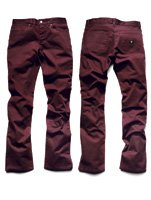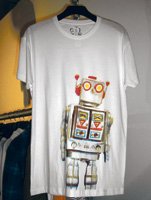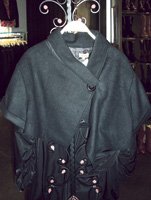Looking for Big Fashion in L.A.'s Little Tokyo
Ray Cho helped open a fashion boutique called Kimski in Los Angeles’ Little Tokyo neighborhood in July, but Cho is still wondering if he made the right real estate decision.
“Little Tokyo has been a place for restaurants,” said Cho, Kimski’s store manager. “Can fashion businesses come here, too?”
It’s a question more than a handful of boutique owners have been asking. In the past two years, Little Tokyo has attracted more than six stores, mostly streetwear fashion and footwear stores, to a place best known as the cultural heart of Southern California’sJapanese-American community.
The neighborhood, located a few blocks away from Los Angeles City Hall, has been long known as a place to grab sushi—and the home of the Japanese American Museum. But the increase in loft development in downtown Los Angeles in recent years made Cho think the area could be a prime place to open a store. Even during the weak economy, a residential building called Little Tokyo Lofts has been advertising condominiums from $200,000 to $1.2 million. With professional people living in lofts, and students from the University of Southern California and Southern California Institute of Architecture regularly passing through Little Tokyo, Cho and others thought this neighborhood would be a natural choice for fashion.
Kaz Shibmon also believed Little Tokyo was the right place for his Cube boutique, which he opened in November at 102 Japanese Village Plaza.
Shibmon was born in the Kagoshima prefecture in Japan, but he chose Little Tokyo as the best place to sell Japanese fashions to Americans. “There’s not so many Japanese here anymore,” Shibmon said of Little Tokyo. “But Americans come here for sushi. They want to buy Japanese things here.”
Cube carries Japanese premium denim such as Nana-La jeans, which can sell for $241, and Cube brand T-shirts, which feature graphics of designer Yuki Toyooka. Cube-brand tees from the “I Am a Robot” series ($29.95) are among the store’s top sellers. Also popular are track jackets with checkerboard designs from Japanese label Easy Job ($159), Japanese sneakers by label Spingle Move ($180) and accessories by Alive East Tokyo.
Contemporary and vintage European and American fashions are popular at Kimski, located at 369 E. Second St. One popular piece has been a swing jacket produced by Los Angeles–based Piko 1988. The navy cropped mini-jacket retails for $68. Also popular has been the “Kwait” track jacket by Dutch brand Gsus. The jacket has a zipper pull shaped like a razor blade and is made from laser-cut fabric that looks artfully slashed by a blade. The track jacket retails for $200, and Gsus jeans, which are also popular, retail for $160.
In January, Kimski will debut a line of tote bags made from vintage leather jackets. The boutique also offers Japanese fashion and sells its house fashion brand, also called Kimski. The boutique and the in-house brand are owned by Environmental Materials Recovery Inc., a 15-year-old Los Angeles–based fashion company specializing in vintage clothes.
One of the veteran boutiques in Little Tokyo is Non Factory, a core skateboard shop that has been retailing skate fashions since owner Tetsuya Okabe took over the store in 2001.
Located at 110 S. San Pedro St., the store’s best-selling items have been T-shirts from Four Star Clothing Co., which retail for $19. Other popular items have been the K-Slim and Super Slim jeans, which are manufactured by Krew, based in Santa Ana, Calif. Price points range from $59 to $64.95. These jeans cling to the body, said Non Factory store manager Abijah Martinez. “If you want to fit into them, you had better take up vegetarianism,” Martinez joked.
Key for Non Factory is the cost of store merchandise. “We’re looking for affordability,” Martinez said. “We’re in the inner city. Our customer base includes many kids whose parents don’t have much money. We’re conscious of that.”
























